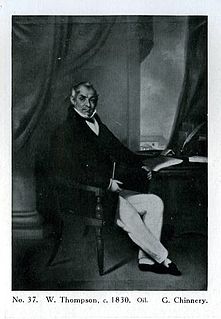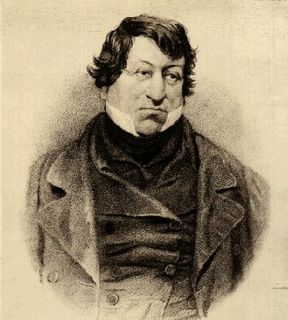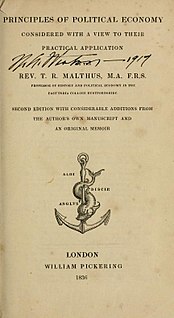Classical liberalism is a political ideology and a branch of liberalism which advocates civil liberties under the rule of law with an emphasis on economic freedom. Closely related to economic liberalism, it developed in the early 19th century, building on ideas from the previous century as a response to urbanisation and to the Industrial Revolution in Europe and the United States. Notable individuals whose ideas contributed to classical liberalism include John Locke, Jean-Baptiste Say, Thomas Robert Malthus and David Ricardo. It drew on the classical economic ideas espoused by Adam Smith in Book One of The Wealth of Nations and on a belief in natural law, utilitarianism and progress. The term classical liberalism has often been applied in retrospect to distinguish earlier 19th-century liberalism from social liberalism.

David Ricardo was a British political economist, one of the most influential of the classical economists along with Thomas Malthus, Adam Smith and James Mill.

Thomas Robert Malthus was an English cleric and scholar, influential in the fields of political economy and demography. Malthus himself used only his middle name, Robert.
The iron law of wages is a proposed law of economics that asserts that real wages always tend, in the long run, toward the minimum wage necessary to sustain the life of the worker. The theory was first named by Ferdinand Lassalle in the mid-nineteenth century. Karl Marx and Friedrich Engels attribute the doctrine to Lassalle, the idea to Thomas Malthus's An Essay on the Principle of Population, and the terminology to Goethe's "great, eternal iron laws" in Das Göttliche.
In classical economics, Say's law, or the law of markets, states that "Supply creates its own demand", the aggregate production necessarily precedes an equal quantity of aggregate demand. Say's Law is often incorrectly said to state that production inherently creates consumption. In his principal work, A Treatise on Political Economy, Jean-Baptiste Say wrote: "A product is no sooner created, than it, from that instant, affords a market for other products to the full extent of its own value." And also, "As each of us can only purchase the productions of others with his own productions – as the value we can buy is equal to the value we can produce, the more men can produce, the more they will purchase."
"The dismal science" is a derogatory alternative name for economics coined by the Victorian historian Thomas Carlyle in the 19th century. The term drew a contrast with the then-familiar use of the phrase "gay science" to refer to song and verse writing.
In economics, diminishing returns is the decrease in the marginal (incremental) output of a production process as the amount of a single factor of production is incrementally increased, while the amounts of all other factors of production stay constant.

John Ramsay McCulloch was a Scottish economist, author and editor, widely regarded as the leader of the Ricardian school of economists after the death of David Ricardo in 1823. He was appointed the first professor of political economy at University College London in 1828. He wrote extensively on economic policy, and was a pioneer in the collection, statistical analysis and publication of economic data.

Malthusianism is the idea that population growth is potentially exponential while the growth of the food supply is linear. It derives from the political and economic thought of the Reverend Thomas Robert Malthus, as laid out in his 1798 writings, An Essay on the Principle of Population. Malthus believed there were two types of "checks" that in all times and places kept population growth in line with the growth of the food supply: "preventive checks", such as moral restraints, and restricting marriage against persons suffering poverty or perceived as defective, and "positive checks", which lead to premature death such as disease, starvation and war, resulting in what is called a Malthusian catastrophe. The catastrophe would return population to a lower, more "sustainable", level. Malthusianism has been linked to a variety of political and social movements, but almost always refers to advocates of population control.

William Thompson was an Irish political and philosophical writer and social reformer, developing from utilitarianism into an early critic of capitalist exploitation whose ideas influenced the Cooperative, Trade Union and Chartist movements as well as Karl Marx. Born into the Anglo-Irish Ascendancy of wealthy landowners and merchants of Cork society, his attempt to will his estate to the cooperative movement after his death sparked a long court case as his family fought successfully to have the will annulled. According to E. T. Craig, this decision to will his estate to the cooperative movement was taken after a visit to the pioneering Ralahine Commune.

Richard Jones was an English economist who criticised the theoretical views of David Ricardo and T. R. Malthus on economic rent and population.
The following events related to sociology occurred in the 1820s.
A Malthusian growth model, sometimes called a simple exponential growth model, is essentially exponential growth based on the idea of the function being proportional to the speed to which the function grows. The model is named after Thomas Robert Malthus, who wrote An Essay on the Principle of Population (1798), one of the earliest and most influential books on population.

The book An Essay on the Principle of Population was first published anonymously in 1798, but the author was soon identified as Thomas Robert Malthus. The book predicted a grim future, as population would increase geometrically, doubling every 25 years, but food production would only grow arithmetically, which would result in famine and starvation, unless births were controlled.
The Political Economy Club was founded by James Mill and a circle of friends in 1821 in London, for the purpose of coming to an agreement on the fundamental principles of political economy. David Ricardo, James Mill, Thomas Malthus, and Robert Torrens were among the original luminaries.

Enquiry Concerning Political Justice and its Influence on Morals and Happiness is a 1793 book by philosopher William Godwin, in which Godwin outlines his political philosophy. It is the first modern work to expound anarchism.
Various definitions of economics have been proposed, including the definition of 'economics' as "what economists do".
John Cazenove (1788–1879) was an English businessman and political economist.










